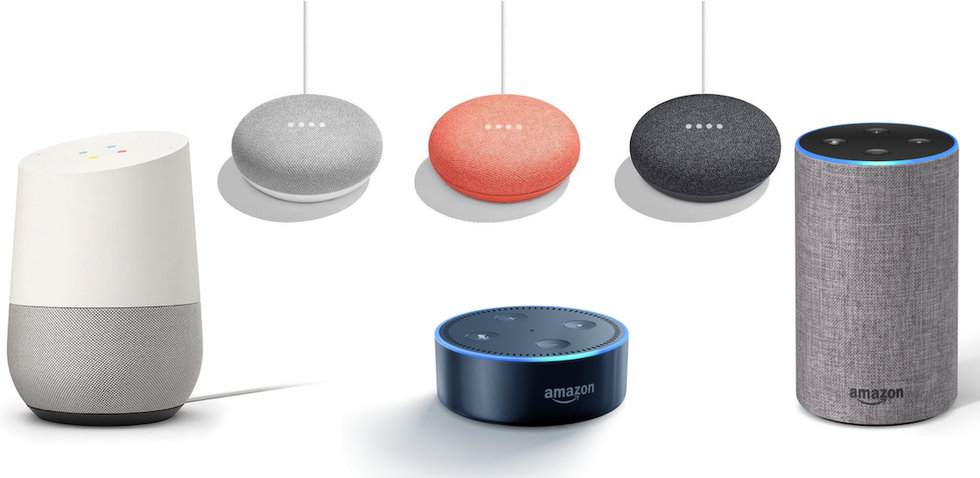Most consumers want smart speakers to listen more, not less
Despite the privacy concerns of smart speakers — and the general creep factor when they start laughing for no reason — two-thirds of consumers want the devices to listen more often, not less.
This is the finding of a survey which asked 6,000 consumers about their thoughts on smart home technology. It found that 66 percent of consumers would be interested in a smart speaker (with an assistant like Alexa or Siri) that listened and interacted with them more often. Just 12 percent of consumers reacted negatively to the idea, with 21 percent were unsure.
Read More:
- Smart speaker adoption rate outpaces smartphones and tablets
- Which smart speaker is right for you? These are the 15 to choose from
- A surprising amount of smart home speakers just need help boiling an egg
The survey was commissioned by Audio Analytic, an AI sound recognition company, and collected the thoughts of 6,000 consumers split equally between the U.S. and UK.
Consider a smart speaker that could switch on an air purifier after hearing someone sneeze on a day with high pollen levels. The survey also suggests a virtual assistant that alerts home owners to the sound of someone knocking at the door, or the noise of a blaring smoke alarm.
Almost everyone asked — 90 percent — said they wanted their smart speakers to do more. This contrasts a recent survey that found smart speaker owners are primarily doing basic things with their Alexa and the Google Assistant devices, such as playing music, hearing news headlines or getting weather updates.
"Voice recognition, music services, and kitchen timers are great but are no longer enough in such a competitive space," said Chris Mitchell, CEO and founder of Audio Analytic to GearBrain. "By being able to recognize and react to important sounds in their environment, smart speakers and other smart home devices could offer many more services – for example enhancing home security by reacting automatically to the sound of a window breaking or smoke alarm sounding, and ultimately greater peace of mind for consumers."
The gateway drug of smart homes
The smart speaker has become something of a gateway drug for first-time smart home builders. The survey found that 65 percent of smart speaker owners plan to buy a smart lock in the next 12 months. Roughly the same number plan to buy smart lights and 52 percent say they're in the market for a smart security camera.
These findings suggest smart home companies across the industry will see their sales increase if the popularity of speakers like the Amazon Echo and Google Home range continues.
That said, more security-critical devices like smart locks are proving less popular. The survey found that 17 percent of smart speaker owners are considering a smart lock in the next 12 months; for people who do not yet own a smart speaker, that figure falls to just four percent.
Despite there being clear demand for more smart home gadgets, cost — especially ongoing monthly subscriptions for devices like security cameras — is a common concern. Just over 60 percent of the 6,000 people questioned cited cost as the biggest factor holding them back from making more smart home purchases.
Audio Analytic said: "62 percent of the survey respondents cited the 'cost of equipment' and the 'cost of ongoing use' as the two main areas that need to improve for them to adopt home control or monitoring systems...Device makers need to offer the right value proposition to their customers."
Consumers are surprisingly positive about AI...
Despite warnings from the likes of Elon Musk, who says AI could pose an existential threat to humanity, consumers are mostly positive about the role of artificial intelligence in their homes.
Over half said they were either "excited by" AI, or "think it will be useful." Negativity towards AI — consumers who said they were worried about it or would avoid it — is low, with these thoughts shared by 16 percent in the U.S. and 15 percent in the UK.
As might be expected, consumers who already own smart home technology are more positive about AI (70 percent), than those who do not own any smart home tech (43 percent).
...and they want their smart home to protect them
Smart home safety and security systems are popular requests from consumers. Almost 80 percent of respondents said they are "likely or very likely" to give permission for smart home devices to monitor the safety and security of their property and possessions - but only as long as privacy concerns were met.
Buy Google Home on Walmart.com for only $99.
Almost all respondents (90 percent) who own a smart speaker or intend to buy one soon said they wanted the device to listen out for safety and security sounds in the home, like the blaring of a smoke alarm.
Health monitoring is also something consumers want, with 59 percent of those who already own a smart home device saying they are "likely or very likely" to give devices permission to monitor their health.
Providing any concerns they have over privacy could be met, 63 percent of consumers with child aged under 16 are "likely or very likely" to give smart home devices permission to monitor the health and well being of the family. This would be done, according to the parameters of the survey, by detecting the sounds of coughing and sneezing within the home.
Check out The GearBrain, our smart home compatibility checker to see the other compatible products that work with Google Home and Home Mini.
